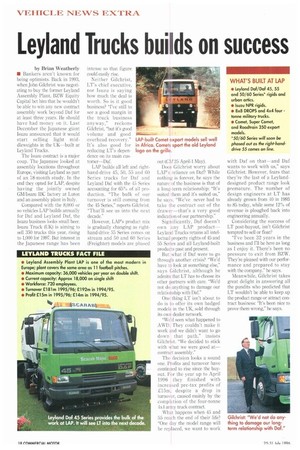Leyland Trucks bui Ilds on success
Page 22

If you've noticed an error in this article please click here to report it so we can fix it.
by Brian Weatherly • Bankers aren't known for being optimists. Back in 1993, when John Gilchrist was negotiating to buy the former Leyland Assembly Plant, BZW Equity Capital bet him that he wouldn't be able to win any new contract assembly work beyond Daf for at least three years. He should have had money on it. Last December the Japanese giant Isuzu announced that it would start selling light middleweights in the UK—built at Leyland Trucks.
The Isuzu contract is a major coup. The Japanese looked at assembly locations throughout Europe, visiting Leyland as part of an 18-month study. In the end they opted for LAP, despite having the jointly owned GM/Isuzu [BC factory at Luton and an assembly plant in Italy.
Compared with the 8,000 or so vehicles LAP builds annually for Daf and Leyland Daf, the lsuzu business looks small beer. lsuzu Truck (UK) is aiming to sell 350 trucks this year, rising to 1,000 for 1997. But interest in the Japanese range has been
intense so that figure could easily rise.
Neither Gilchrist, LT's chief executive, nor ISUZU is saying how much the deal is worth. So is it good business? "I've still to see a good margin in the truck business any way ," reckons Gilchrist, "but it's good volume and good overhead recovery." It's also good for reducing LT's dependence on its main customer—Daf.
LAP builds all left and righthand-drive 45, 50, 55 and 60 Series trucks for Oaf and Leyland Oaf with the 45 Series accounting for 65"0 of all production. "The hulk of our turnover is still coming from the 45 Series," reports Gilchrist. "That'll see us into the next decade."
However, LAP's product mix is gradually changing as righthand-drive 55 Series conies on stream and 50 and 60 Series (Freighter) models are phased
out ((1125 April-1 May).
Does Gilchrist worry about LAP's reliance on Daf? While nothing is forever, he says the nature of the business is that of a long-term relationship: "It's suited them and it's suited us," he says. "We've never had to take the contract out of the drawer—that's a very good indication of our partnership."
Significantly, Daf doesn't own any LAP product— Leyland Trucks retains all intellectual property rights of 45 and 55 Series and all Leyland-built products past and present.
But what if Daf were to go through another crisis? "We'd have to look at something else," says Gilchrist, although he admits that LT has to choose its other partners with care. "We'd not do anything to damage our relationship with Daf."
One thing LT isn't about to do is to offer its own badged models in the UK, sold through its own dealer network.
"We'd seen what happened to AWD. They couldn't make it work and we didn't want to go down that path." insists Gilchrist. "We decided to stick with what we were good at— contract assembly."
The decision looks a sound one. Profits and turnover have continued to rise since the buyout. For the year up to April 1996 they finished with increased pre-tax profits of £15m, despite a drop in turnover, caused mainly by the completion of the four-tonne lx4 army truck contract.
What happens when 45 and 55 reach the end of their life? "One day the model range will be replaced, we want to work
with Oaf on that—and Daf wants to work with us," says Gilchrist. However, fears that they're the last of a Leylanddesigned product range look premature. The number of design engineers at LT has already grown from 40 in 1993 to 85 today, while some 121'/.0of revenue is ploughed back into engineering annually.
Considering the success of LT post-buyout, isn't Gilchrist tempted to sell or float?
"I've been 32 years in the business and I'll be here as long as I enjoy it. There's been no pressure to exit from BZW. They're pleased with our performance and prepared to stay with the company." he says.
Meanwhile, Gilchrist takes great delight in answering all the pundits who predicted that LT wouldn't be able to keep up the product range or attract contract business: "it's been nice to prove them wrong," he says.












































































































